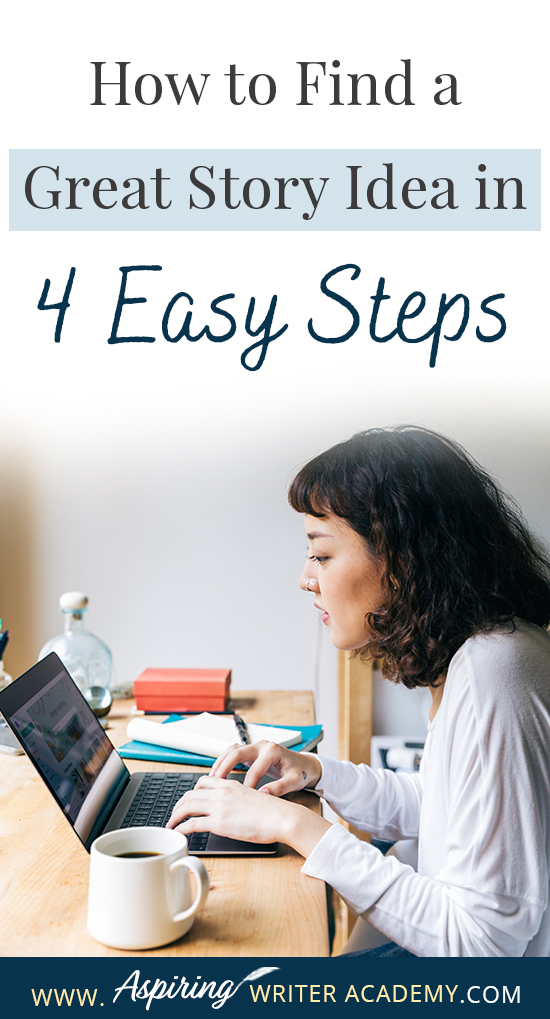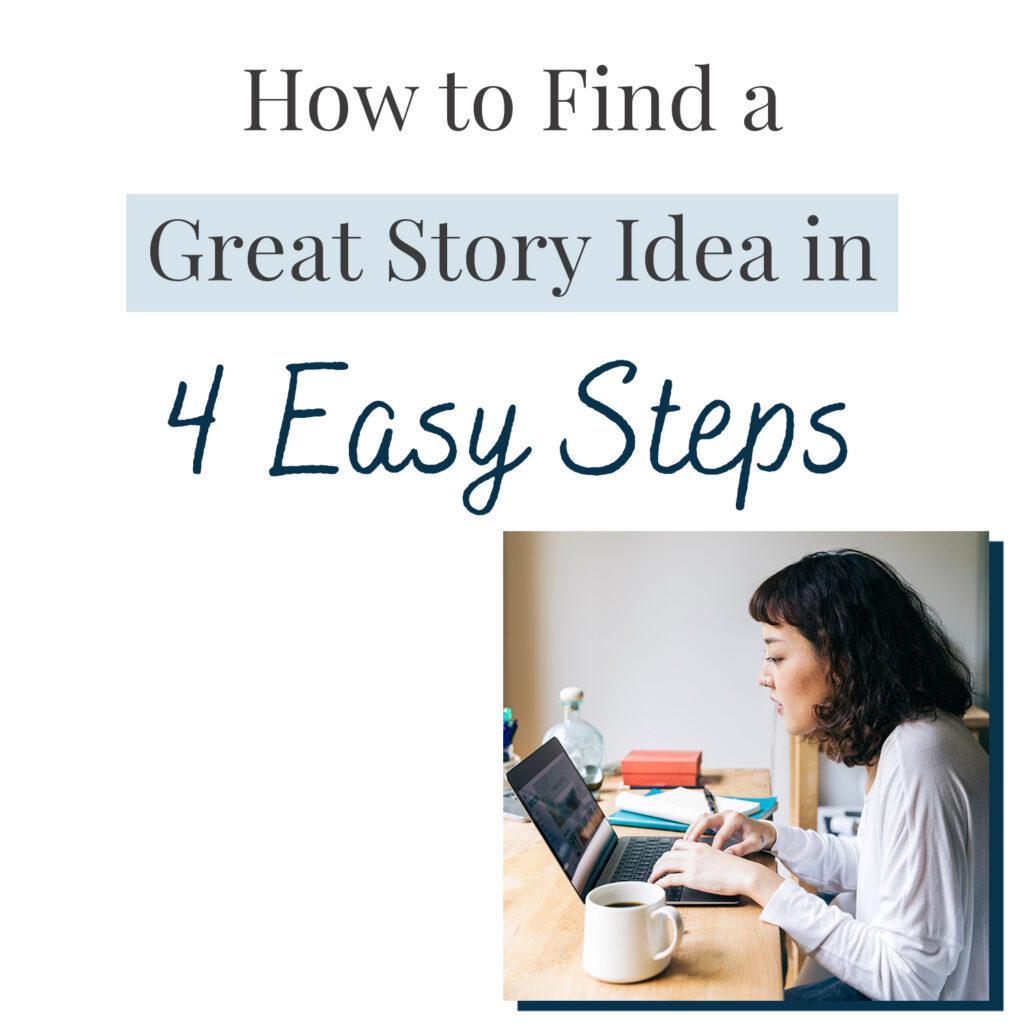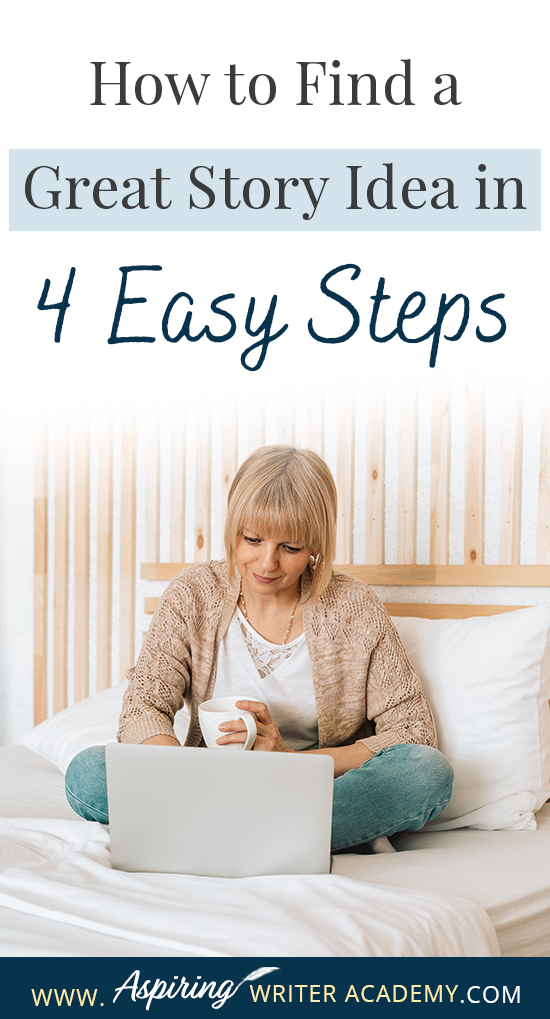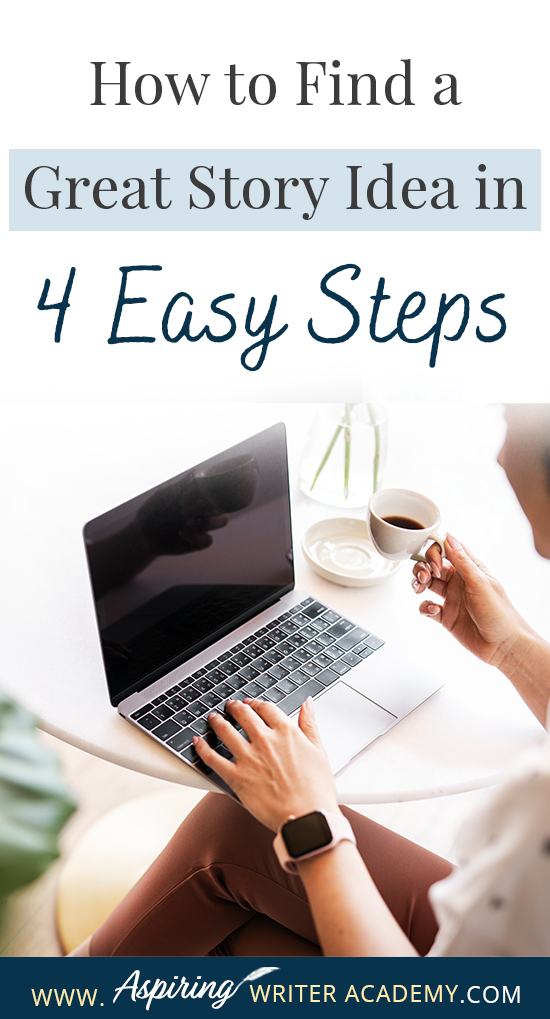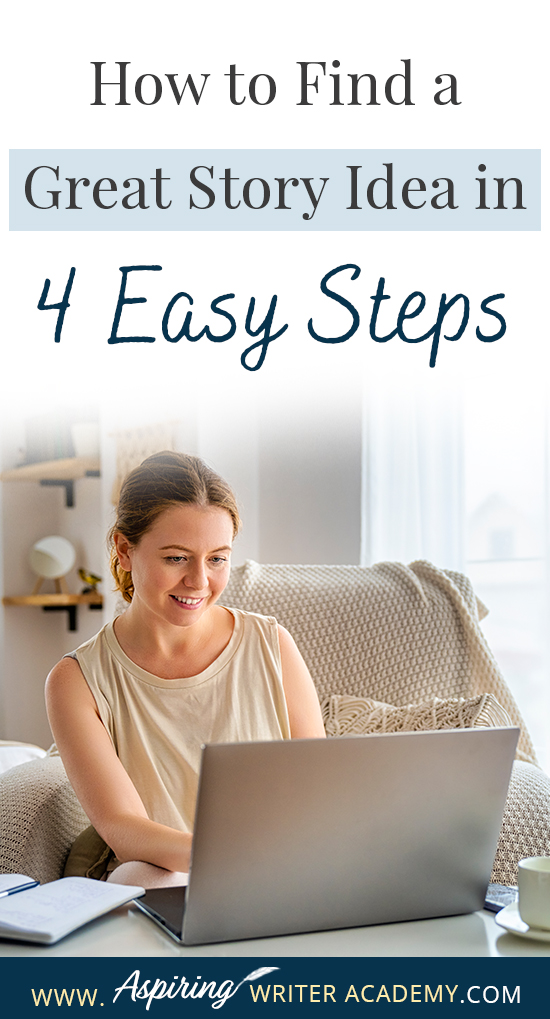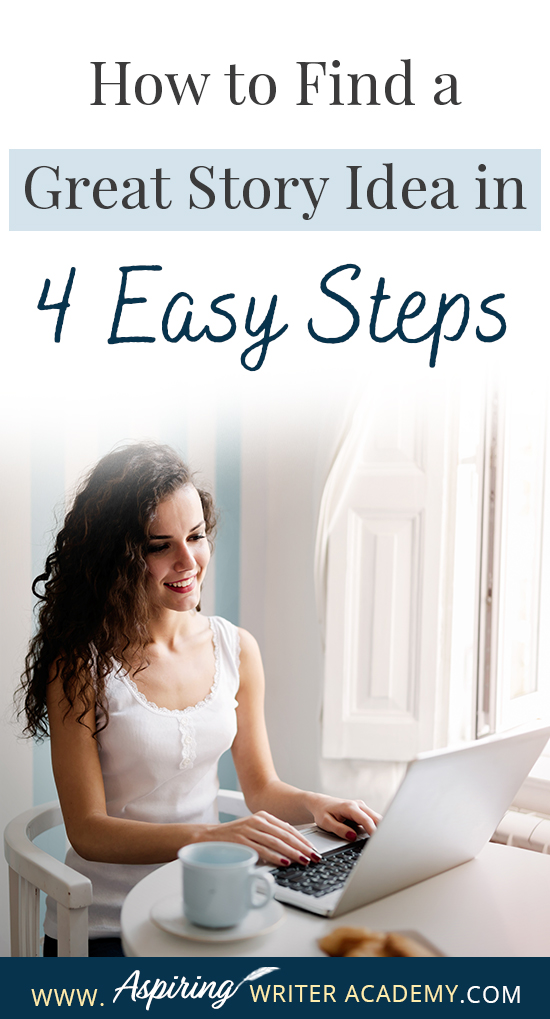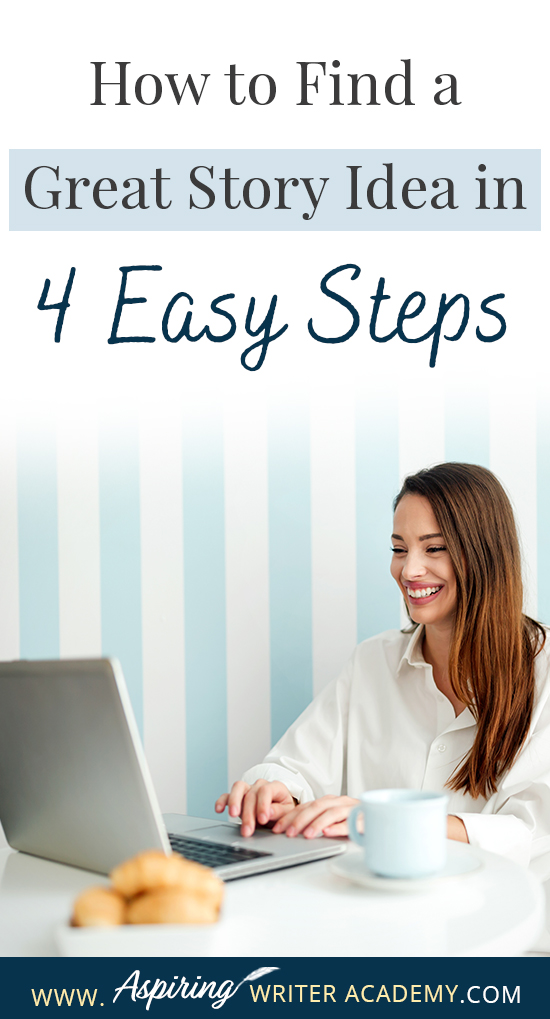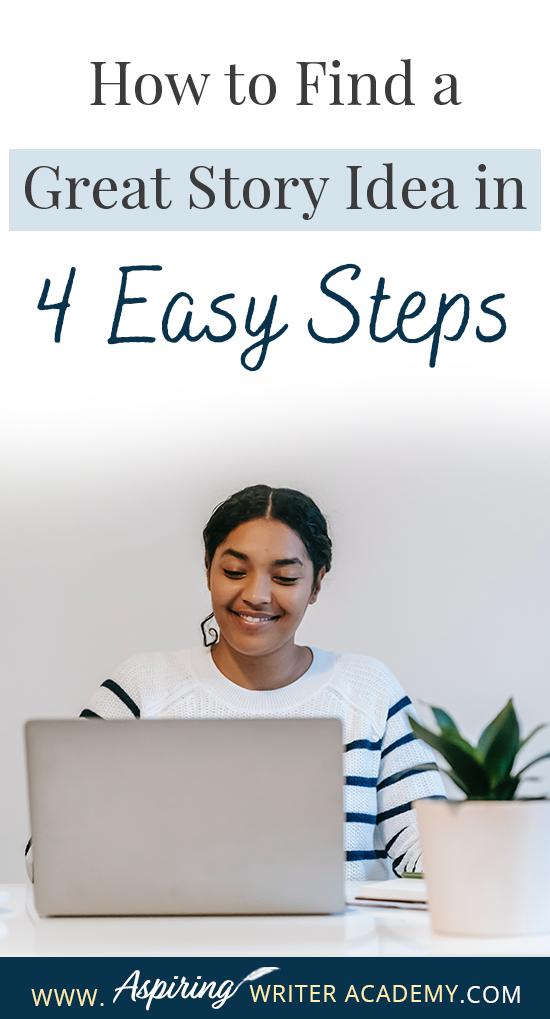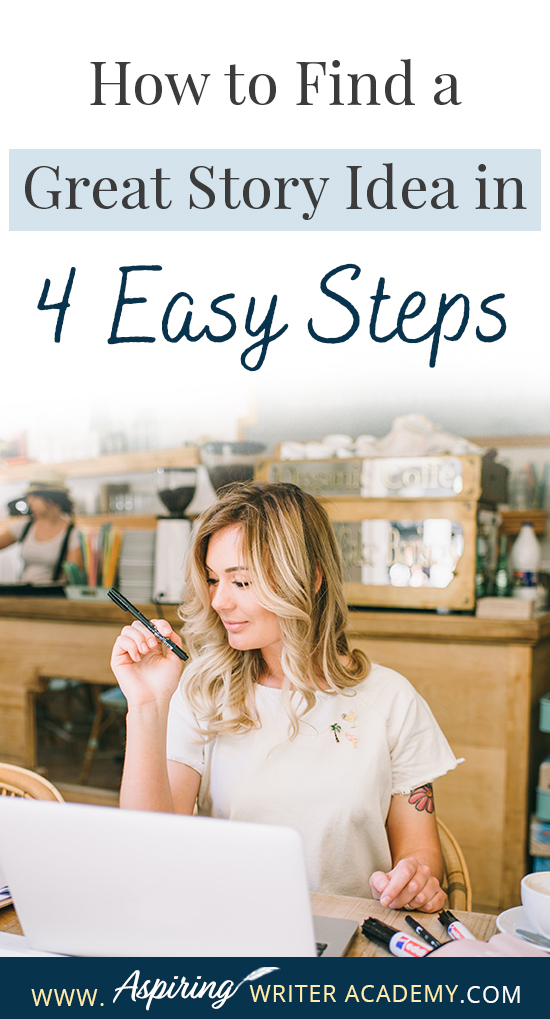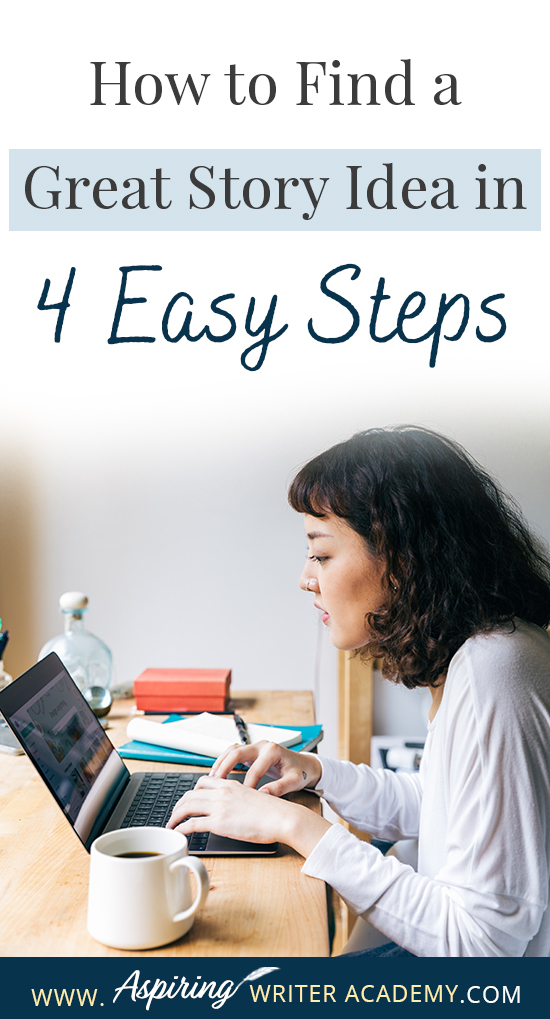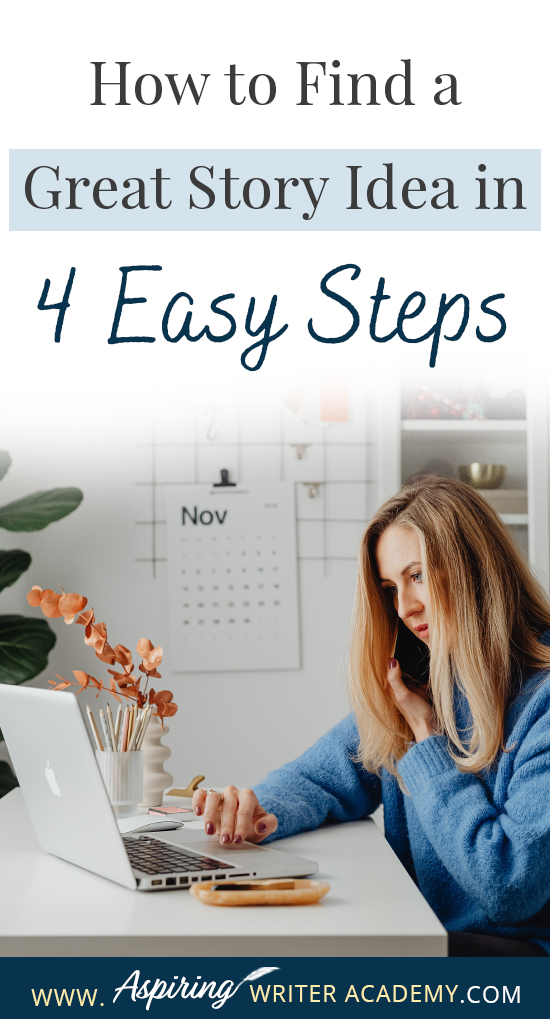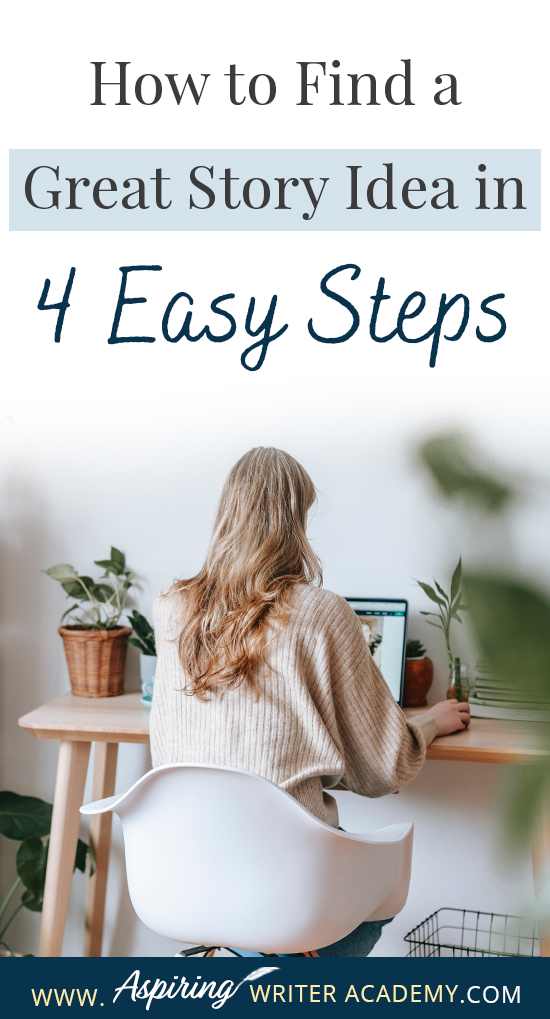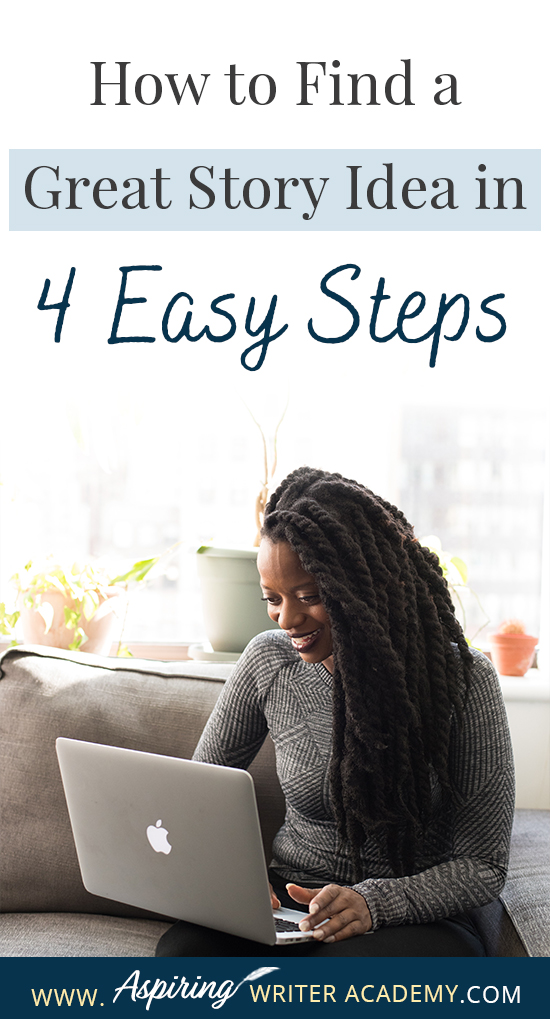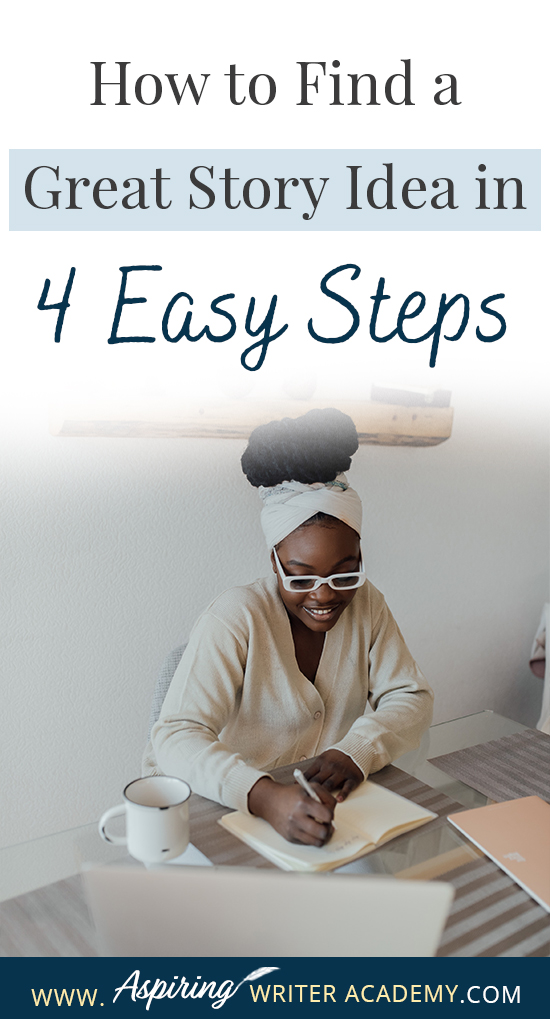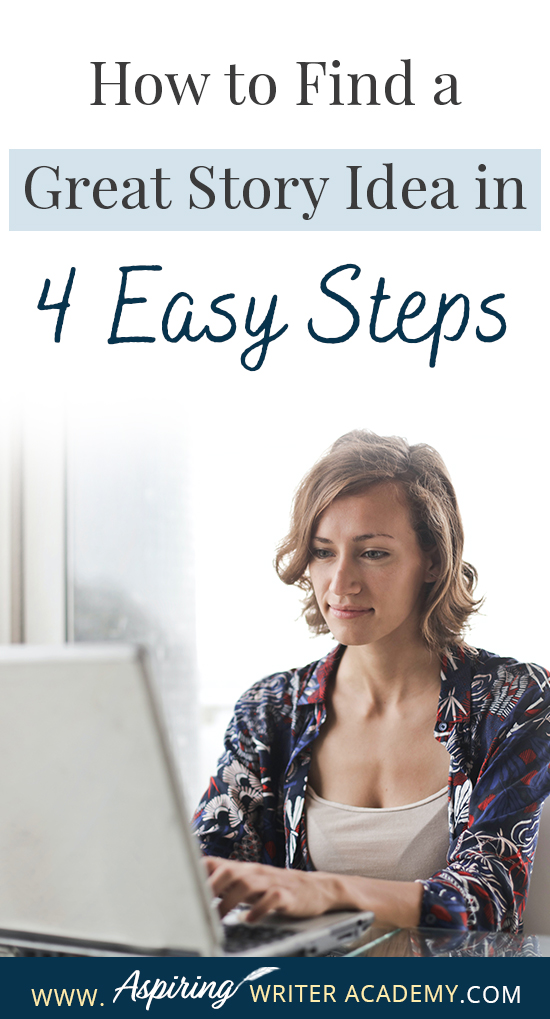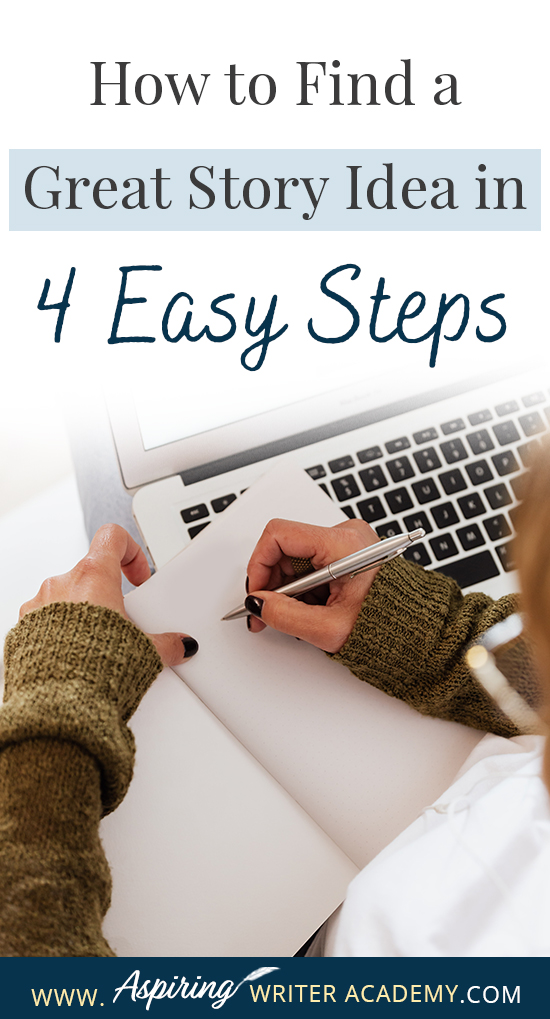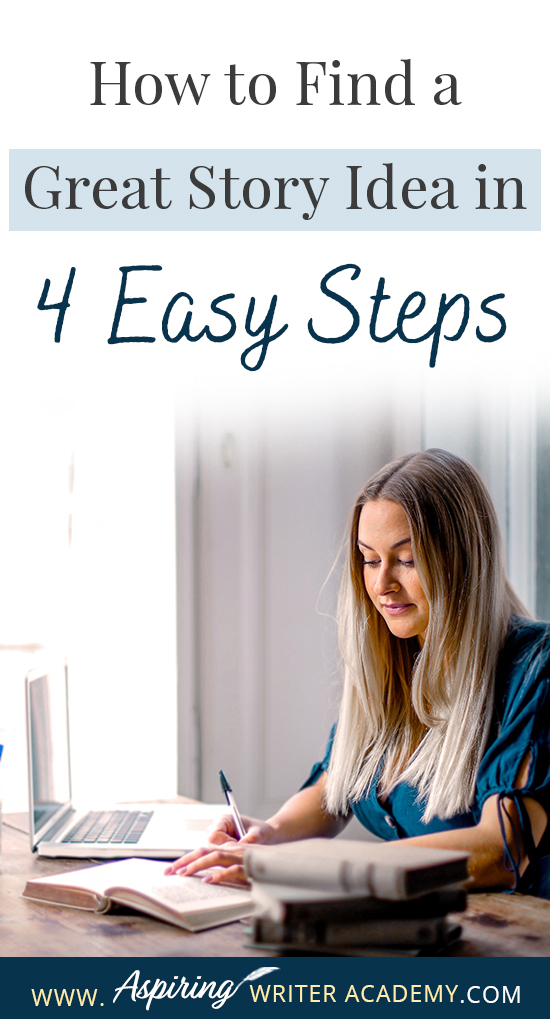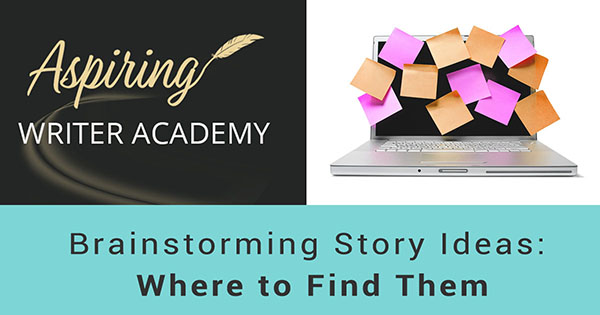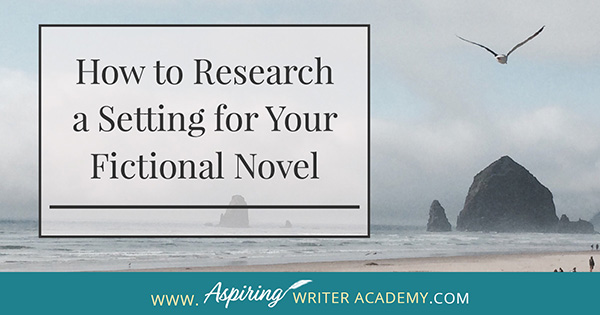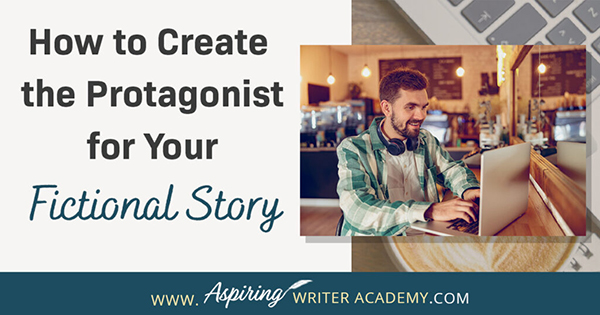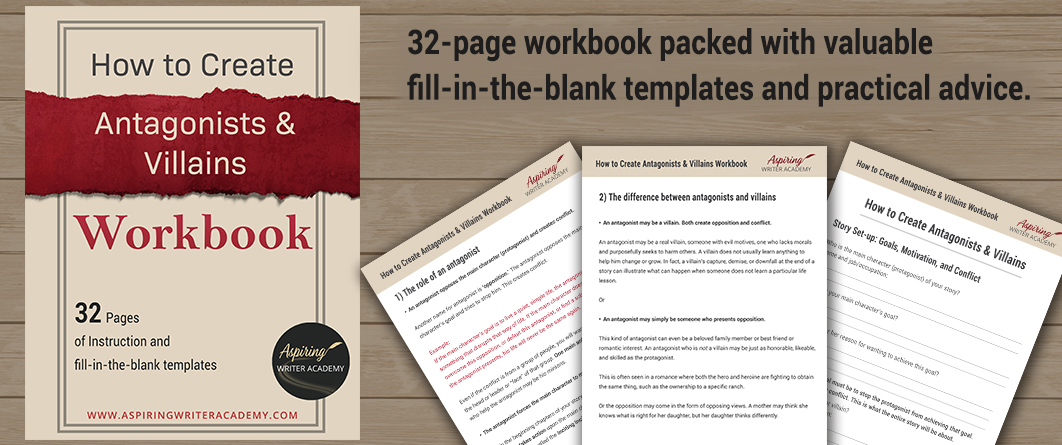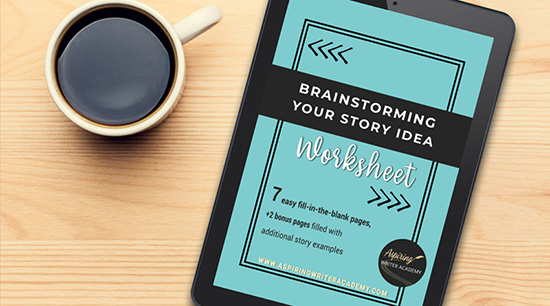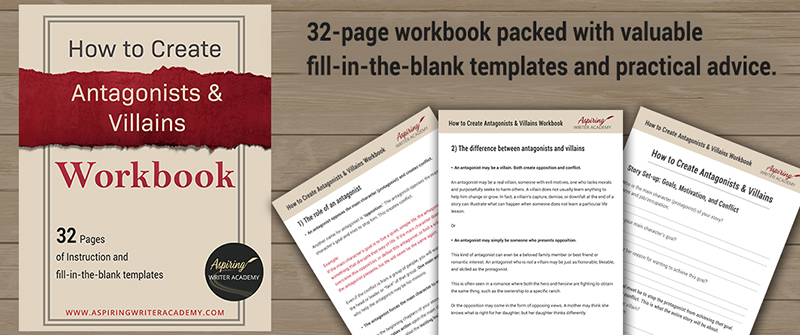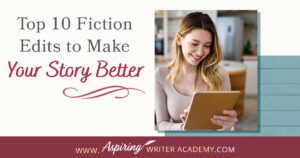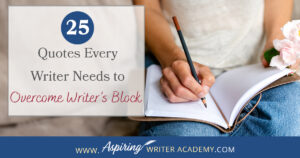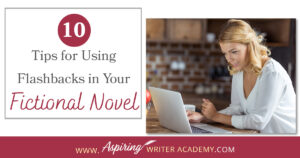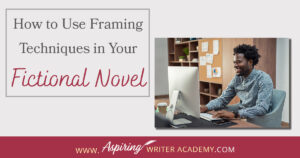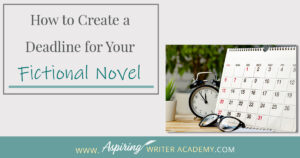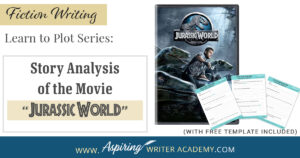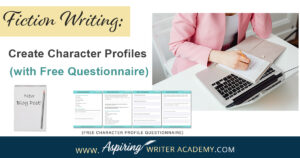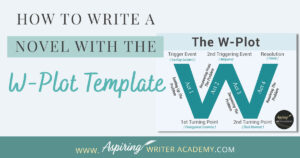How to Find a Great Story Idea in 4 Easy Steps
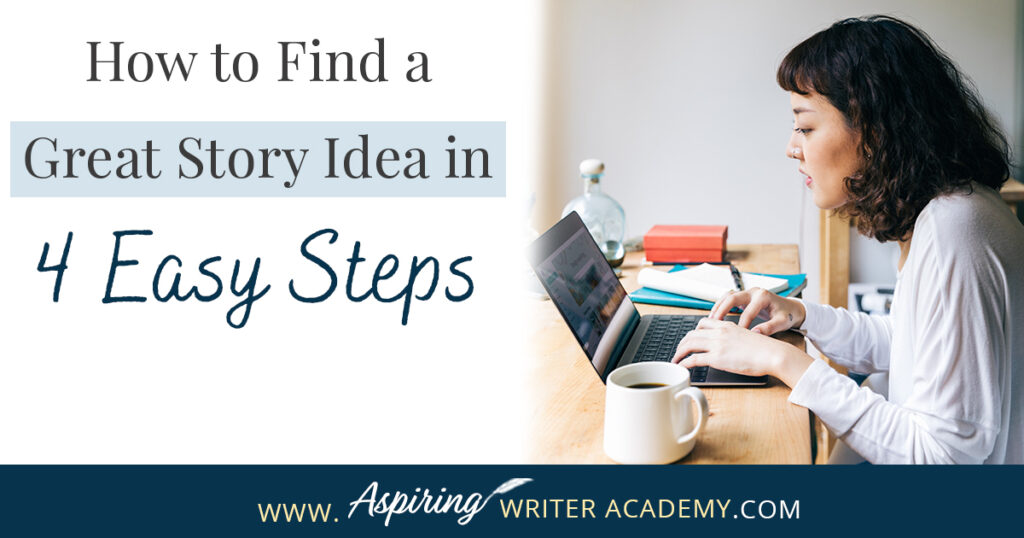
How do you come up with new story ideas for a fictional novel? Do you start with a situation or a character or with a concept, theme, or location? How do you know if you have a solid story idea? What information is needed to get started?
In our post, How to Find a Great Story Idea in 4 Easy Steps, we lay out the four components that will help you create a working story idea that you can turn into a fictional novel.
In the post below we will discuss:
- Genre
- Setting
- Your Protagonist
- The Opposition
But first…
How do you start? Where do you find that initial spark of interest or tidbit of information to generate a story idea?
The key is to be an observer, to look around at the world around you, read newspapers, magazines, travel pamphlets with unique landmarks and local lore.
— Perhaps you will start with an idea for the genre—you are fascinated by the concept of werewolves or vampires or maybe you always wanted to write a time travel story, a mystery, or an epic family drama. Or perhaps a unique concept or theme or message will suggest a genre in which you would like to write.
— Or maybe your initial idea will come from the setting. Maybe you’ve always wanted to research the Civil War or how to open a candy shop or write a story about a historical statue you saw in the park. Maybe you are fascinated by train stations or life on other planets or aquariums.
— Your story idea could also start with a character based off a fascinating person with whom you’ve had a chance encounter, a person who struck you as odd or exhibited a unique personality trait that either had you smiling or shaking your head. Or perhaps you read about an interesting individual online or got an idea for a character by watching a movie or TV show.
— Another possible way to start is to find a problem, situation, or conflict that makes you sit up and go ‘oooh!’ You see something in life or online or in the newspaper (an obstacle or opposition or devastating event) that has the potential to cause all kinds of conflict for numerous individuals. You think—how could this situation play out or be resolved?
No matter how you start out, you will need all four parts to come together to create a solid story idea for your fictional novel.
Follow along as we discuss each one in more detail.
1) Genre
The term ‘genre’ signifies what type of fiction you are writing. Traditional publishers need to know where bookstores will place your fictional novel. What category would you place your novel in?
Some of the most popular genres of popular fiction writing are romance, mystery, suspense, thriller, women’s fiction, fantasy, science fiction, and paranormal or speculative fiction. There are also sub-genres within each category such as: romantic suspense, historical romance, cozy mystery, time-travel mystery, apocalyptic thriller.
If you are hoping to submit your work to traditional publishers, you should know the various genres of writing and the expectations within each. If self-publishing, you will also need to know which categories to place your novel online.
Read widely and find which genre you like best. Study the rules or expectations of that genre.
Example:
Readers expect romances to have a happy ending with the main couple falling in love and making a commitment to one another at the end. If one lover dies at the end of the story, it is not a romance. It would need to fit into another genre such as women’s fiction, etc., depending on the other elements included in the story.
Don’t mix too many sub-genres if you are just starting out and do not just ‘make up’ your own genre. Both publishers, booksellers, and readers have specific expectations. Keep it simple.
Which genre or category of writing are you most drawn to? Which types of books do you generally read? Since you will be working on this story for quite some time, it makes sense to choose a genre that you enjoy and one that you will feel comfortable staying in for at least 4 to 5 more books to establish an author platform.
Does your initial spark of a story idea fit into a specific genre? Or does the setting or character or situational conflict (opposition) you chose suggest a certain genre for your fictional novel?
See Our Blog Post: Brainstorming Story Ideas: Where to Find Them
2) Setting
If you are new to writing, it might be easiest to choose a setting that you are familiar with. Do you have experience with a specific profession? What skills or abilities do you have? Have you traveled to a certain location?
Example:
If you are a firefighter, you know everything you need to know to write a fictional story featuring firefighters. Settings used in the story would likely include fire stations with fire trucks and other fire-fighting equipment. You could write such a story with authenticity.
Similarly, if you are a nurse, you could use your knowledge to write a story that takes place in a hospital. If you are a day-care provider, you are familiar with children and might write a story where one of the characters is a day-care provider. If you are skilled at tennis, you might want to write a story where there are tennis courts. If you love to bake, you may want to write a story about a bakery. If you rock climb, you may want to write a suspense featuring rock climbers.
If you have traveled to other states or countries, you have first-hand experience enabling you to write fictional stories set in those locations. If you are writing historical fiction or want to use a location that you have never visited, you might have to do too much research before getting your story off the ground. And that will waste a lot of time.
But what if you only know a part of what you will need? Write what you know and research the rest. Make sure that you have a passion for researching this location or setting or you may get bored and come off looking like an amateur to your reader.
Think back to your initial spark of an idea—what was it?
Can you now fit your idea for genre, or character, or the opposition (problem or conflict) into a specific setting?
Of course, you can use more than one setting for your novel, but which one will be the main setting? The most dominant?
Can you sit down and tell an editor or agent:
‘My story is set in September 1812, Boston, Massachusetts.’ Or ‘my story is set in present-day Africa during the heat of summer.’ Or ‘the main setting for my novel is set in modern times off the coast of California on Catalina Island.’ Or ‘the main setting for my novel is set in a futuristic world where spaceships are the main mode of transportation.’
See Our Blog Post: How to Research a Setting for Your Fictional Novel
How do you find a story idea for your fictional novel?
First decide upon a genre and the general setting for your fictional novel, then choose a main character with a specific goal and brainstorm who (or what) could be the opposition trying to stop him/her from achieving that goal.
3) Your Protagonist
The protagonist is the main character of your fictional novel. This is the point-of-view character who will take action to pursue a specific goal and needs to fight the opposition trying to stop him from achieving that goal.
Considering the genre and the setting, who is the best person to be your protagonist in this story? What is his or her profession?
Example:
If you are writing a romance set in the Midwest, your protagonist may own a ranch and will be the one entering a romantic relationship and fall in love. Or perhaps she lives on a farm or in a small town and is hiding from something in addition to love—until she meets the cowboy next door.
If you are writing a mystery set in France, your protagonist should be the one trying to solve the mystery and perhaps he or she is a pastry chef. Or perhaps he or she is the owner of a castle or a painter or French architect. Perhaps it is their connection to their profession that helps them find and follow the clues to solve the mystery.
If you are writing women’s fiction, and you have experience working in a school, perhaps you could choose that to be your setting and create a protagonist who is a teacher or counselor or school principal (someone who would work in that location.)
However, it is important that you create a character who is unlike you so that you do not end up writing about yourself. Your characters will need to make their own decisions which fit the needs of the story and keep the plot on track. Give your protagonist one or two physical traits or personality traits that you do not have.
Look at your genre and setting and create a list of all the professions and types of people you might find in a place like this. Create a cast list. Now if your initial idea started with an interesting problem, situation, conflict, or idea for opposition…who would be the best person in this cast to be the main character, the protagonist?
Who is this story going to be about?
What is this character’s goal? What does he or she want to do? And why?
See Our Blog Post: How to Create the Protagonist for Your Fictional Story
4) The Opposition
Considering the genre, setting, and your protagonist and their story goal, who (or what) could provide the best opposition for this story?
The opposition will create an enormous amount of conflict for your main character.
Is the opposition an antagonist (purely an opponent) or a true villain who will try to stop your main character from achieving their goal?
Or is the opposition a force of nature, like a hurricane heading straight for a small town threatening to wipe out everything in its path?
Or is the opposition within the main character himself as he struggles to overcome a disability or mental challenge?
Example:
A military veteran amputee struggles to walk again using a prosthetic leg so that he may win a 10K race and use the prize money to support his sister.
Once you define who (or what) the opposition is, you will need to decide:
What will the opposition do? How will the antagonist or villain oppose the main character? What is their plan? How will they attempt to stop the protagonist from achieving their goal?
It is the opposition that makes the story interesting. The stronger the conflict created by the opposition, the more tension to hook your reader into turning page after page!
Is your opposition’s plan to thwart the protagonist exciting enough? Is it action-oriented? Does the antagonist create a situation that will leave your readers breathless and keep them sitting on the edge or their seat? Or dire enough to hook them into clutching a box of tissues as they read your tear-jerker? Is the opposition’s plan strong enough to stir the readers emotions?
What will the main character (protagonist) need to do to overcome this opposition and achieve his goal? What are the consequences if he fails?
If you aren’t sure if you have a worthy story idea, test out your idea on two or three trusted friends who value story.
In one line include the genre, setting, your main character and the opposition.
Example:
In a romantic thriller set in present-day New York City, a talented concert pianist must find and expose the fanatical song lyricist threatening her life and hopes he is not the same man she has fallen in love with.
Ask yourself: What will your main character have to overcome?
Keep testing and tweaking your story idea until you create something unique that piques your interest. Then go write! Some of the best ideas come while you are already putting words down on the page.
Looking for an easy way to organize your thoughts? We invite you to download our How to Create Antagonists & Villains Workbook with fill-in-the-blank templates for $5.99 to help you create worthy opposition for your main character.
We hope you have enjoyed How to Find a Great Story Idea in 4 Easy Steps and that you have gained some valuable insight and tips to start your novel writing journey!
If you have any questions or would like to leave a comment below, we would love to hear from you!
If you like more help developing your story, you may wish to download our Free Brainstorming Your Story Idea Worksheet
Do you find it difficult to create compelling antagonists and villains for your stories? Do your villains feel cartoonish and unbelievable? Do they lack motivation or a specific game plan? Discover the secrets to crafting villains that will stick with your readers long after they finish your story, with our How to Create Antagonists & Villains Workbook.
This 32-page instructional workbook is packed with valuable fill-in-the-blank templates and practical advice to help you create memorable and effective antagonists and villains. Whether you're a seasoned writer or just starting out, this workbook will take your writing to the next level.
Our Goal for Aspiring Writer Academy is to help people learn how to write quality fiction, teach them to publish and promote their work, and to give them the necessary tools to pursue a writing career.
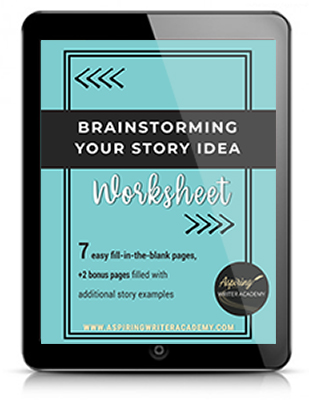
ENTER YOUR EMAIL BELOW
TO GET YOUR FREE
"Brainstorming Your Story Idea Worksheet"
7 easy fill-in-the-blank pages,
+ 2 bonus pages filled with additional story examples.
A valuable tool to develop story plots again and again.
Other Blog Posts You May Like
How to Brainstorm a New Novel Using Goal, Motivation, and Conflict
How Writing Prompts Can Improve Your Fictional Story
Fiction Writing: 5 Key Differences Between a Novel and a Novella
Brainstorming Fiction: What to Do When Your Story Gets “Stuck”
How to Plot Your Fictional Novel (with Free Template Included)
5 Questions to Create Believable Villains
Why Your Characters Need Story-Worthy Goals
3 Levels of Goal Setting for Fiction Writers
Fiction Writing: How to Name Your Cast of Characters
10 Questions to Ask When Creating Characters for Your Story
Basic Story Structure: How to Plot in 6 Steps
Brainstorming Story Ideas: Where to Find Them
How to Write a Novel While Working Full Time
Slingshot Week: How to Set New Goals for Writing in 2023
The Pros and Cons of Writing Holiday Fiction (Collections & Anthologies)
Fiction Writing: How to Find a Critique Partner/Group
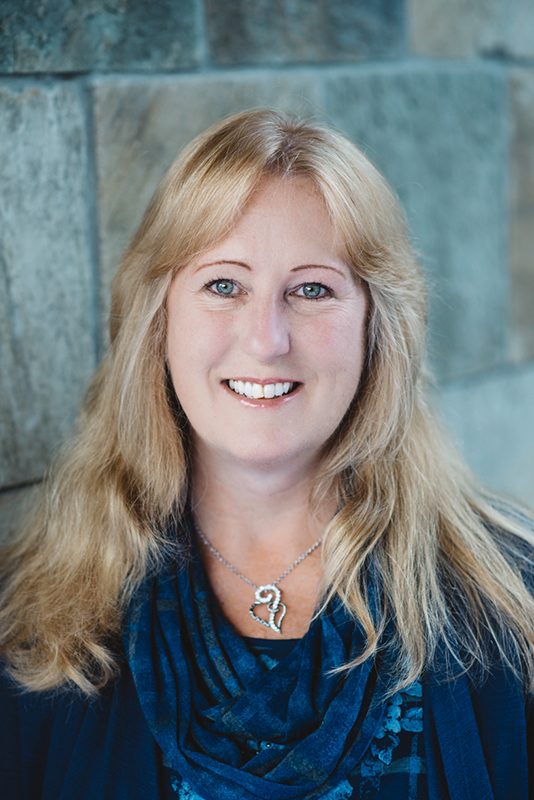
is a multi-published author, speaker, and writing coach. She writes sweet contemporary, inspirational, and historical romance and loves teaching aspiring writers how to write quality fiction. Read her inspiring story of how she published her first book and launched a successful writing career.
